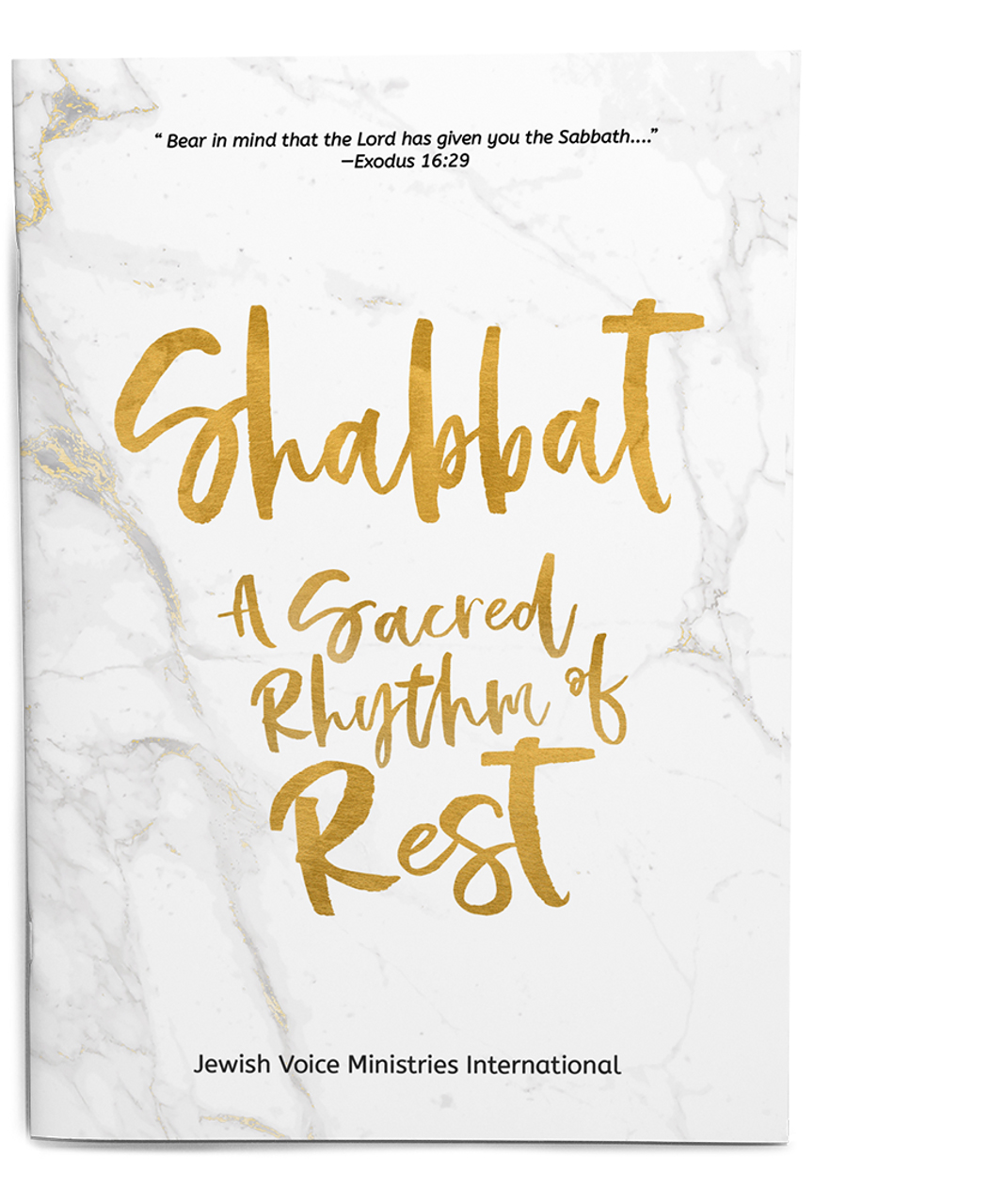Shabbat – A Gift From the Lord

Click to request your copy of "Shabbat: A Sacred Rhythm of Rest"
It’s Friday afternoon, and a sense of expectancy is building in Jewish minds throughout the world. Jewish homemakers bustle about cleaning, preparing a meal and setting a beautiful table. In workplaces, Jewish men and women anticipate the mental shift they’ll experience in just a few hours – no more pressure from deadlines, work problems, meetings or striving to please bosses and clients.
You may say, “Well, doesn’t everyone feel this way about Friday? The weekend’s coming when they can leave the workweek behind.” Ah, but there’s something different about Friday in the Jewish mind. For us, Friday afternoon is the threshold of much more than the weekend.
Friday night begins Shabbat. The ceasing. Our weekly rest. Shabbat is the Hebrew word for the Sabbath, and Jewish people also call it Shabbos. Shabbat, Shabbos, the Sabbath – they all refer to the same day of rest that we find in Scripture.
Shabbat is about more than merely not working. It’s more than having free time. It’s a time we welcome in with intentionality, purpose and the warmth of centuries-old traditions.
Life today runs at a breakneck speed that seems only to get faster. We live in an age of timesaving tips and pre-prepped meal kits – designed to help us pack more into our days than at any other time in history. There’s work to do, progress to make, and achievements to accomplish! We take ourselves or our children from one activity to another to not miss out on opportunities, many of which genuinely enrich our lives. The thing is, there’s just so much available to us nowadays.
The amount of information alone is mind-boggling. According to research done in 2022 by Techjury, a company that tests and reviews software, an estimated 7.5 million blog posts are published every day. The internet holds more than 2 billion websites worldwide. Even with only 20 percent of them active, 400 million information repositories are available to us. 1 Cable and satellite TV bring hundreds of channels into our homes, and there are more than 100 on-demand and streaming services in the U.S., offering programming across a variety of genres.
Today’s smartphone technology means we can take all these resources with us almost anywhere, and we are always reachable. That perpetual availability blurs the line between work and rest, and we often find our jobs seeping into our personal lives.
In his book, Margin, Dr. Richard Swenson notes that each of us has a finite capacity in four life areas: physical, emotional, financial and time. When we operate at our limits, with no buffer for rest or coping with life’s surprises, we are bound for a breakdown in one or several areas.
We understand intellectually that we need rest and can feel its effects when we’ve experienced it. We’re refreshed mentally, physically, and emotionally. Even so, sometimes, it’s hard to let ourselves pursue it. Stopping work is one thing; not worrying about the work that isn’t getting done is another. The pressure of feeling perpetually behind can be hard to ignore. To relieve it, many people work harder, work more, faster and more efficiently. But the Work Harder approach is a myth.
When we brush our hands together and say, “There, now. That’s done,” it relates only to a particular project. The feeling of accomplishment is often short-lived as another responsibility lies waiting. We can’t possibly finish all the work that life presents us. We empty the sink or dishwasher, and almost immediately, another dirty dish starts the accumulation all over again. A company meets its sales goals only to have higher production costs force it to ramp things up to maintain the same profit. An artist could never create all the ideas his or her mind imagines. As Believers, we will never exhaust the opportunities to serve, meet needs or love people in Messiah’s name.
No, we will never run out of work. There will always be more than we can get done in a day, a week, or a lifetime. The weight of things we must do, should and could do with our time can become overwhelming.
As vital as rest is to us, attaining it doesn’t come naturally. Many of us approach our off-time in the same manner as work. Friday afternoon often signals the start of two days of cramming in our hobbies, entertainment and household responsibilities. We crowd our schedules to the point that our weekends become just as busy as our work weeks. And we wonder why we don’t feel the benefits of our leisure time. The truth is, most of us don’t know how to rest.
Enter Shabbat.
It is the fourth of the 10 Commandments. It is the first-mentioned of God’s ordained feasts. And it is a sign between God and His Chosen People.
Amid the frantic pace of 21st-century life, Jewish obedience to a God-commanded weekly day of rest holds strong, having steadfastly endured, week after week, throughout the centuries. Instead of Friday cueing two days with a same-pace/different-undertakings schedule, in the Jewish mind, Friday afternoon heralds the onset of the sweet gift of rest – in obedience to the Lord.
From the outside looking in, Shabbat may appear constrictive, a rule of law that dampens our enjoyment of life. The apostle Paul noted that laws can inflame our sinful nature, making us naturally prone to rebellion. We crave the forbidden and resist the commanded. Tell us to do or not do something, and we suddenly develop a temptation for the opposite. So, when it comes to observing the Sabbath, we may find ourselves dismissive or reluctant to embrace it. However, those who keep it faithfully recognize that rather than restrictive, Shabbat is a gift.
And with today’s lifestyles, we need Shabbat’s rhythm of rest more than ever.
Shabbat is a command from God – which is reason enough to embrace it. However, in a world that perceives downtime as unproductive and perhaps even shameful, Shabbos is even more than a command from God. Shabbat is permission to rest, a permission that our overloaded selves need.
Judith Shulevitz, in her New York Times article titled “Bring Back the Sabbath,” wrote, “Most people mistakenly believe that all you have to do to stop working is not work.” However, it’s not as simple as that. “You cannot downshift casually and easily, the way you might slip into bed at the end of a long day.”
Shulevitz maintains that the rules of the Jewish Sabbath reveal that “interrupting the ceaseless round of striving requires a surprisingly strenuous act of the will, one that has to be bolstered by habit as well as by social sanction.”
Researchers have long known that sleep replenishes our bodies and minds. During those unaware hours, our brains remain active, sorting the day’s stimuli, cataloging memories, and removing toxins. Likewise, science has learned that idle time allows room for our brains to enter a default mode that is essential to certain mental processes.
The Gift of Shabbat
The Jewish year is set to the cadence of the biblical feasts. Shabbat is the only weekly feast among the other annual observances. Shabbos brings the yearly rhythm of life down to the weekly level, setting and resetting the tone of life seven days at a time. Shabbat is a gift that offers us the stability of a regular, intentional time when we step out of the fray and hide ourselves in the haven of the Lord’s gift of rest. It takes time and practice for those who haven’t grown up to the tempo of a weekly sabbath rest.
Shabbat is a weekly reset. For 25 hours, from just before sunset on Friday evening to just after nightfall on Saturday, we suspend our regular routines and welcome the rest God commanded. It is a time of refreshment and renewal, a time to engage with the Lord, family and friends. It is a gift from God that we welcome as a beloved friend. It recenters our perspective, reminding us that God is King of the universe, Lord of all, and Lord of our lives. It prompts us to recall that He is the source of our strength and hope. He is our provider, worthy of our praise and trust.
If observing Shabbat is new to you, allow us to meet you at the doorstep with a broad smile and a hearty “Shabbat shalom!” wishing you “Sabbath peace!” We are delighted you’re here. As we throw an arm around your shoulder, we invite you to join us in a sacred tradition, one that comes from the Lord Himself – one that is designed to fill a deep need in you, return your focus to Him, and steady you with a weekly rhythm of restoration for body, soul and spirit. We invite you into what has been a Jewish act of obedience to the Lord since the Exodus and the 10 Commandments. However, the concept of Shabbat goes even further back than that.
Click to request your copy of "Shabbat: A Sacred Rhythm of Rest"
Set your Shabbat table with this attractive group of serving items for your Shabbat ceremony. This kit includes: a wood breadboard with a Scripture; a deep blue challah cover with the Hebrew words “Shabbat Shalom” printed in white; two ceramic candlesticks to hold your own candles; a gold-rimmed Kiddush cup; and the book Shabbat: A Sacred Rhythm of Rest.





